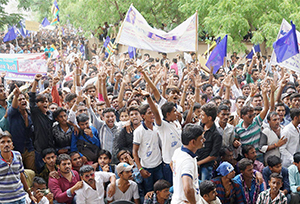Ahmedabad, Jul 31: The ongoing agitation by Dalits in Gujarat claimed its first victim from the community when one of the over 20 youths who had attempted suicide died today even as thousands of protesters converged at a rally here where the state's BJP government came under attack.
The state dalit leaders while asking their community to give up the work of disposing dead cattle to "send a message" to the government also warned that if atrocities on the community does not stop they will "show their strength" in the Assembly polls in Gujarat due in 2017.
Yogesh Hirabhai Solanki, 25, was rushed to Ahmedabad civil hospital at midnight last night from Rajkot after his condition deteriorated but passed away soon after, police said.
Solanki had attempted suicide along with two others at Parabari village in Dhoraji taluka of Rajkot on July 19 during the statewide protests against thrashing of Dalits in Una for skinning a dead dow on July 11.
A policeman was killed in Amreli town on July 19 when Dalit protesters pelted stones at a police station.
As part of their continuing protests over the assault on their community members, thousands of Dalits attended a mass gathering organised in Sabarmati area here.
At the rally, Dalit leaders also demanded firm steps to curb atrocities on the community.
The leaders also announced a plan to organise a foot march from here to Una town in Gir-Somnath District, where four Dalits were brutally thrashed by cow vigilantes for skinning a dead cow, from August 5 as a mark of protest against the July 11 incident which caused an outrage.
Addressing the gathering, Dalit leader and Convener Jignesh Mevani put forward a slew of demands before the State Government and asked his community to take a pledge to stay away from their traditional work of disposing the dead cattle.
"To give a strong message to the Government, I urge all Dalits to discontinue the work of disposing dead animals. I also want you to take a pledge of discontinuing the work of cleaning sewer lines. We no longer wish to do this work and want Government to allot agriculture land to us, so that we can live a respectable life," said Mevani.
"If atrocities on Dalits does not stop, Dalits will show their strength in the 2017 Assembly polls," he asserted, targeting the BJP Government in the State.
He put forward a series of demands and asked the Government to come to the table for talks, just like it did with the Patel quota leaders.
"We want everyone who thrashed Dalits in Una to be arrested under PASA. If they come out on bail, Government must extern them from five districts," he said. PASA is a stringent law dealing with anti-social activities.
Other demands include withdrawal of cases filed against Dalits during recent protests, speedy probe in the 2012 Thangadh police firing (in which 3 Dalits were killed), allotment of five acres of land for community members who want to discontinue their traditional work and martial arts training to SC members for self defence.
"This agitation will continue till Government accepts our demands. If Government can sit with Patels and accept their demands, it should do the same with Dalits and call them for a meeting," said Mevani.





Comments
Add new comment